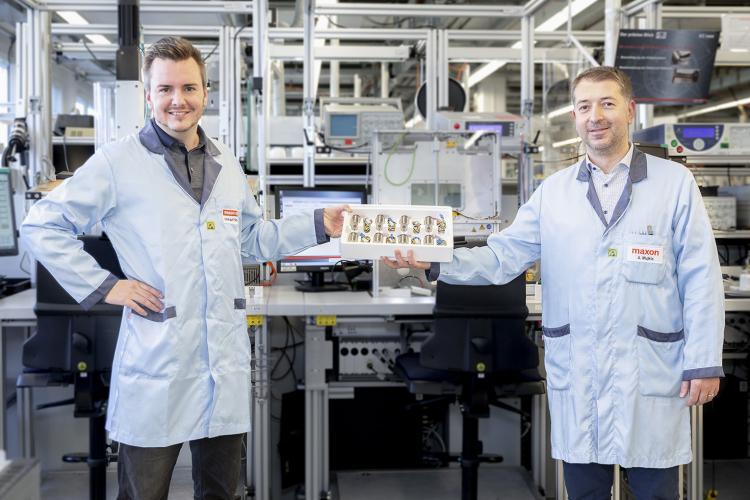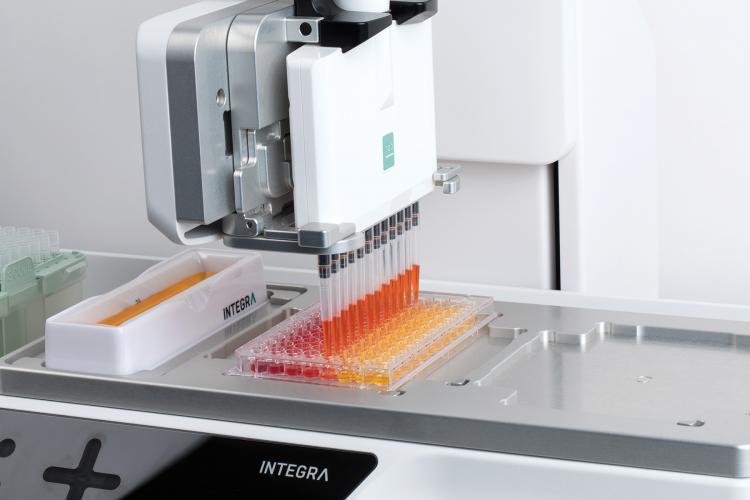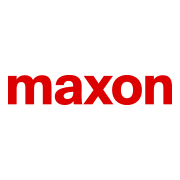INTEGRA Biosciences develops and produces electronic pipettes and pipetting robots which have been used in a large number of laboratory processes relating to COVID-19. During the pandemic, the testing capacities of the laboratories have been pushed to their limits. INTEGRA had to act fast to cover the high demand for automated liquid handling instruments. Drive systems from maxon are used in the electronic pipettes. So at maxon too, fast action was required in order to supply additional electric motors to the customer more quickly.
Stephan Hegetschweiler, sales engineer at maxon Switzerland, and Amir Mujkic, head of the Cylindrical EC motor production line in Switzerland, explained how they and their teams mastered the challenge.
What caused the impending bottleneck at INTEGRA?
Stephan Hegetschweiler: The orders from INTEGRA increased substantially already at the beginning of the year. But the bottleneck was not yet foreseeable at that stage. Then, in the middle of the first coronavirus wave in April, their purchasing manager contacted us. The demand for liquid handling devices had increased so sharply that there was an imminent risk of a production stop in INTEGRA’s device assembly due to a lack of materials. To head off that bottleneck, we took action immediately and switched to crisis management mode. After all, this was about saving lives.

And what kind of action did you take?
Amir Mujkic: We rescheduled all our ongoing orders at short notice, and freed up extra human resources for the EC-max production line. To keep the lead time for the express order as short as possible, it was very important to keep a close eye on our overall coordination and the information flow in the production process. Downstream departments, such as the final QA inspection and shipping, were informed in advance about the important order.
What are the most important prerequisites for successful delivery and processing of orders like this?
Stephan Hegetschweiler: The best thing the members of the team can do is to communicate continuously. That means talking to people, analyzing bottlenecks in detail, communicating your success, and just involving everyone who can successfully move the order forward. The rapid flow of information between maxon and INTEGRA was effective for the express order.

ASSIST-PLUS pipetting-robot
Amir Mujkic: An express order can come at any time, and our production staff know that too. So I know I can rely 100% on the flexibility of the staff. In these situations, there is always a
high level of willingness to work beyond the usual working hours. Cooperation plays a very important role here. If the communication and processes in the team are right and everyone knows what their tasks are, then on-time delivery to the customer goes smoothly.
How can future bottlenecks be prevented for customers?
Stephan Hegetschweiler: With rush orders, it’s important that senior management gets involved too, so the customer knows that we take the problem very seriously. It’s also helpful if the customer submits more orders right from the start. In the case of this express order, we suggested to INTEGRA that we should produce and store a safety buffer of drives that they can then access in an emergency. Close collaboration with the customer and the transparent communication that goes with that helped us to process the order quickly, to the customer’s satisfaction.

